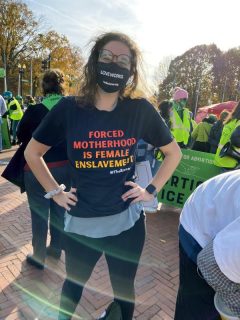This interview with Dahlia Lithwick, writer for Slate.com, originally appeared December 16 on The RNL—Revolution, Nothing Less!—Show and can be watched here.
Sunsara Taylor: In the days since the fascist majority on the Supreme Court showed their fangs on December 1, making clear to the world that they are poised and likely eager to gut abortion rights nationally, possibly even overturning the landmark Roe v. Wade decision of 1973, many voices and commentators have been adjusting to this loss of abortion rights in advance and even downplaying the danger that this will pose to women. This made one of the headlines of our next guest stand out all the more. Not only ring true, but stand out. She wrote, “We Are Not Going Back to Before Roe. We’re headed somewhere worse,” and we’re really happy to talk with her about this and much more of what’s at stake right now with these Supreme Court cases. Dahlia Lithwick is a writer for Slate.com. She covers the courts and the law, and she is also the host of the podcast Amicus. Dahlia, welcome back to The Revolution, Nothing Less! Show. We’re so happy to have you with us.
Dahlia Lithwick: Thank you for having me back. And yes, things have gotten grimmer since last we spoke.
Sunsara Taylor: Yeah, well, I want to start with that title, “We’re Not Going Back to ‘Before Roe,’ We are going somewhere worse.” For people who are not familiar, younger people and others, we shouldn’t downplay the horror of what it was for women pre-Roe v. Wade. Millions and millions of women had their lives foreclosed by pregnancies and children they didn’t want. They were forced into marriages in suffocating conditions, or even abusive. Thousands of women died for lack of safe, legal abortion. I interviewed the novelist and poet Marge Piercy years ago and she described her best friend who died from an illegal abortion and she put it very poignantly, she said, “It was a time when falling in love could kill you.” With that in mind, which I think you are very familiar with, what the real stakes were, you say we are going towards something far worse. I would love if you could explain that.

Dahlia Lithwick: Sunsara, I am so glad you start with not soft-pedaling how bad it was pre-Roe because I think we have this sort of sepia-toned memory, that maybe it wasn’t so terrible, right? And so, no one wants to diminish how truly awful it was pre-1973. But, the thing I wanted to get at in this piece is that even pre-1973, when you had a patchwork of laws operative in different states and it was really tricky and confusing and terrifying, as you say, to try to terminate a pregnancy, the thing that we are looking at now with the Supreme Court and the project of “fetal personhood,” which is a theological idea—that the minute you have a fertilized egg you have a person…. We have Justice Sam Alito asking questions like, “Doesn’t the fetus have rights?” You have this really, urgent, pressing need on the part of a pro-life community that isn’t just about fetal personhood, but is about doing away with certain “abortion-causing drugs” that they say also end life. So, to set the stage, I would just say that all of that was not the issue. When we were talking, not you and I, but in the ’60s and ’70s about the movement that opposed abortion. First of all, the organized church was not a big player in this, that happened after Roe and as a result of Roe. But the idea that we are going to set the time marker back to sweep in not just abortion, all abortion, no exceptions for rape and incest, the health of the mother, but to sweep in contraception, to sweep in in vitro, to sweep in surrogacy.
That’s the project now. And I just think that if we don’t see that as the stakes, then we are missing where this is going. And that’s what is to me, chilling, and I put this in the piece, at least in Roe, if you read Justice Blackmun’s opinion in Roe, the right is between a woman and her doctor and it’s always a male doctor. And that’s what he talks about. And he mentions doctors as much as he mentions women. Women were considered sort of infants in their own right. And so you had to help them, and that’s what the doctor was there for. That’s gone now, and we are seeing a regime of criminalizing miscarriage, of criminalizing drug use while pregnant. So I guess I just want to really unspool the whole parade of horribles, which is not what life was like pre-Roe.

Sunsara Taylor: You talk about fetal personhood, and I think it’s important that you note that’s a theocratic concept. There’s no basis for that argument outside of religion, and yet it’s being talked about, it’s being normalized. Could you talk about how sweeping and radical the impact of enshrining full rights to a fetus, an embryo, a blastocyst would be?
Dahlia Lithwick: As to the sort of scope of how broad this notion of fetal personhood could be, I described in my piece two professors who filed an amicus brief in this case where they were really urging that fetal personhood, as you said, starts with a fetal embryo.
The scope of what they are arguing for in this amicus brief, which is again completely laced with theological principles, is a world in which every time a pregnancy ends, a mother could be criminally prosecuted. It feels like we are sliding inexorably into something that looks a lot like The Handmaid’s Tale. And I don’t use that lightly. Where the mother as incubator, who has less rights than the quote unquote “person” in her womb, is the world that they are positing as the next step. And if listeners haven’t followed this really shocking case out of Oklahoma, where a young woman, Brittney Poolaw, who was 19 years old, went to a hospital suffering a miscarriage and was first of all held for a year pending trial and then after a very, very brief trial sentenced to four years in prison for manslaughter because she used drugs while pregnant. I think that that really highlights the double-edged sword here, where now it’s not, “Oh, you know, you endangered your child, but you were a child yourself.” It’s that you go to jail now because you miscarried. And I think that’s just such a far cry from the world pre-Roe.
Sunsara Taylor: I want to shift to some of what’s happening with Texas’s SB 8, the most radical abortion ban that is currently now three months on the books. Women in Texas have not been able to access abortion after six weeks, which is way before most women know they’re pregnant. There’s no exception for rape and incest. And the double threat of this law is that not only is it cutting off this foundational right of women, it is enforced by vigilante bounty hunters. It was written in such a way as to try to insulate the law from any challenge in court. Recently, the Supreme Court heard this again to consider whether to allow any challenges to go forward against this law and without getting totally into the weeds on what they’re going to allow, what they’re not going to allow, they cut off a lot of avenues for challenging this law. And I want to ask you about that, but I also want to bring in that it was a very radically divided Supreme Court in responding to this. In her response, Justice Sotomayor, compared this law and what it’s doing to John C. Calhoun, who was, as she puts it, a virulent slaveholder and defender of the slave system and a defender of the idea that fundamental rights should be left up to the states. That’s a very strong comparison she’s making, and she notes that the nation fought a civil war over that proposition. I’d like to hear what you think the significance of that is.
Dahlia Lithwick: I think I would start from this place: In the course of a week and a half, the court heard both the Dobbs argument that you and I were discussing that’s the Mississippi 15-week ban and issued the decision in that Texas SB 8 case. If you read the Justice Gorsuch opinion for the court in SB 8, the word “woman” and “women” appears once. Other than the title of the case, which is Whole Woman’s Health, so it’s on every page, but other than the title of the case, the word woman appears once and it’s quoting the statute. It’s quoting SB 8. So, in fact, the word “women” appears zero times in terms of a description of whose rights and interests are at issue. If you read Justice Sotomayor’s dissent that you were just citing, you will find the word woman, women, pregnant person, woman, women, pregnant person, which is exactly, by the way, what you may recall Justice Ruth Bader Ginsburg did in Hobby Lobby, right?
That was the religious liberty case where religious business owners didn’t want to give contraception to their employees who were not co-religionists, but who said that every time we afford contraception to our employees, we are triggering an abortion. So again, that’s a completely theological argument. And you may recall, Justice Alito, in his majority opinion allowing them to withhold contraception, uses the word “women” almost not at all. It was Justice Ruth Bader Ginsburg who wrote, “women… women… women… women… pregnant people… pregnant people.”
So, start with the predicate, which is it would seem as though women and pregnant people are utterly invisible to the majority of the court. They don’t even figure. It’s not even worth saying the word women to rebut women’s claims because they’re not even material enough to show up. And I just start from that because it’s shocking. And so I think that’s the part of my answer.
The other part of the answer is the big structural answer, which is SB 8 was designed, as you say, to evade judicial scrutiny because no state actor implements this ban. It’s a six-week ban, as you said, and there’s nobody to sue. So the guts of the SB 8 lawsuit was the provider saying: “We need to be allowed to sue somebody to enjoin this thing that’s how unconstitutional laws are stopped.” And the court allowed this very narrow tunnel for four prospective people, licensing agents in Texas, to be sued. The reason that we have not seen Texas revert to giving post-six-week abortions is that is no protection at all. And that’s really the thing that Sotomayor, and by the way Chief Justice John Roberts—noted hater of abortion rights—joins her on the proposition that, this is in fact allowing a state to nullify federal constitutional law. And that’s the point she’s making. And that’s why you have the comparison to John Calhoun, because what she is saying is if you give states a green light to say, “Oh, we’ve got this really clever scheme”—stratagem is the word the Chief Justice used—“so that no court can review this and set this aside,” you are essentially reverting to slaveholders who were nullifying federal law in the name of state sovereignty.
Sunsara Taylor: Dahlia, I want to thank you so much for making the time again to come join us here on The Revolution, Nothing Less! Show.
Dahlia Lithwick: Thank you for having me, it’s always a pleasure.
